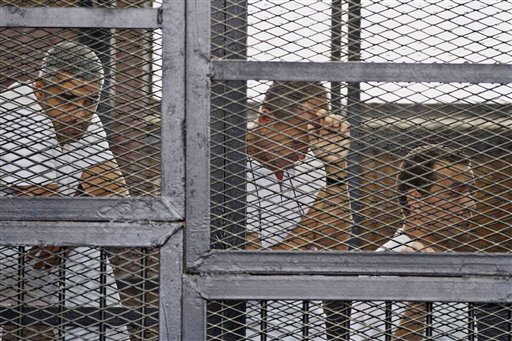CAIRO (AP) — An Egyptian court on Monday convicted three journalists from Al-Jazeera English and sentenced them to seven years in prison each on terrorism-related charges, bringing widespread criticism that the verdict was a blow to freedom of expression.
The three, Australian Peter Greste, Canadian-Egyptian Mohammed Fahmy and Egyptian Baher Mohammed, have been detained since a December raid on their Cairo hotel room, which they were using as an office as they covered protests by supporters of the ousted Islamist president. The raid was part of a broad crackdown against Islamists and the Muslim Brotherhood.
They had pleaded innocent, saying they were simply doing their jobs as journalists. But they were charged with supporting the Brotherhood, which has been declared a terrorist organization, and of fabricating footage to undermine Egypt’s national security and make it appear the country was facing civil war.
The prosecution provided little evidence in the case, showing video footage found in their possession — most of which had nothing to do with the case, including a report on a veterinary hospital in Cairo, Christian life and old footage of Greste from previous assignments elsewhere in Africa.
“I swear they will pay for this,” Fahmy, who was Al-Jazeera English’s acting Cairo bureau chief, shouted angrily from the defendants’ cage after the sentences were announced in the Cairo court Monday. Greste, a correspondent, raised his fists in the air.
“They just ruined a family,” said Fahmy’s brother Adel, who was attending the session. He said they would appeal the verdict but added that he had little faith in the system. “Everything is corrupt,” he said. Greste’s brother Andrew said he was “gutted” and also vowed to appeal.
Australian Foreign Minister Julia Bishop said, “We are all shocked by this verdict,” adding that the government would contact newly elected Egyptian President Abdel-Fattah el-Sissi and ask him to intervene in the case.
“The Australian government urges the new government of Egypt to reflect what message is being sent to the world,” she said. “We are deeply concerned that this verdict is part of a broader attempt to muzzle media freedoms.”
The three received sentences of seven years each in a maximum security prison. Mohammed, the team’s producer, received an extra three years because of additional charges of possession of ammunition. Al-Jazeera has said that charge was rooted in a spent shell found in his possession — a souvenir he’d picked up from protests.
There were 17 other co-defendants in the case. Among them, two British journalists and a Dutch journalist who were not in Egypt and eight others being tried in absentia each received 10-year prison sentences. Two of them were acquitted, including the son of Mohammed el-Beltagy, a senior figure in the Muslim Brotherhood. Most of the co-defendants were students, arrested separately and accused of giving footage to the journalists.
The managing director of Qatar-based Al-Jazeera English, Al Anstey, said in a statement that “not a shred of evidence was found to support the extraordinary and false charges against them.”
“To have detained them for 177 days is an outrage. To have sentenced them defies logic, sense, and any semblance of justice,” he said.
The arrests of the journalists were part of a broad crackdown on the Brotherhood and other Islamists who have been holding protests since the July 3 ouster of President Mohammed Morsi by el-Sissi, the head of the military at the time. Security forces have killed hundreds of Morsi supporters and arrested thousands more.
The crackdown has already raised fears of suppression of any form of dissent, since police have also arrested non-Islamist opponents, largely for breaking a draconian law passed in December banning protests without a prior police permit.
Attending the session, Canadian ambassador David Drake said there are many questions over the verdict.
“We are very disappointed,” he said. “We are digesting this … We have to put our faith in the judicial system. We don’t understand this particular verdict.”
British ambassador James Watt also said he was disappointed, adding, “Freedom of expression is fundamental to any democracy.”
Before the verdicts, Australian Prime Minister Tony Abbott said Monday he spoke with el-Sissi over the weekend and told him that Greste was innocent. “I did make the point that as an Australian journalist, Peter Greste would not have been supporting the Muslim Brotherhood, he would have simply been reporting on the Muslim Brotherhood,” Abbott told reporters in Canberra.
“The point I made was that in the long run, a free and vigorous media are good for democracy, good for security, (and) good for stability,” he said.

COMMENTS
Please let us know if you're having issues with commenting.